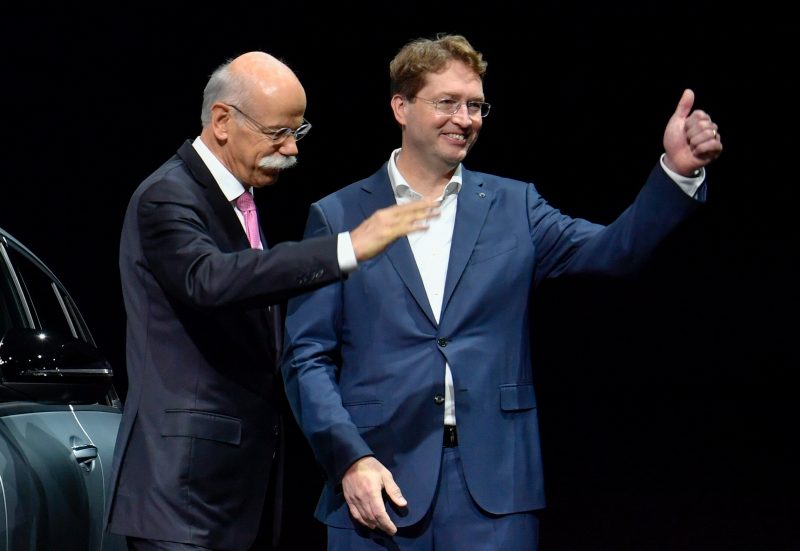Daimler puts new CEO behind the wheel amid tricky gear change
Dieter Zetsche handed over the wheel of Mercedes-Benz maker Daimler to his Swedish successor Ola Kallenius on Wednesday (John MACDOUGALL)
Berlin (AFP) – Flamboyant Daimler boss Dieter Zetsche bowed out after 13 years on Wednesday, leaving successor Ola Kallenius to tackle problems brewing under the bonnet of the Mercedes-Benz maker.
Zetsche, 66, is credited with saving Daimler and skillfully managing the 2007 divorce from Chrysler, but his successor faces challenges as the German car industry struggles to convert to electric vehicles.
Kallenius, previously head of research and responsible for the switch to electric, officially replaced Zetsche at the end of Wednesday’s annual general meeting in Berlin.
Zetsche’s departure marked the end of an era, as the 49-year-old Swede becomes Daimler’s first foreign CEO in over five decades.
“Without Mr. Zetsche, Daimler would no longer exist,” Ferdinand Dudenhoeffer, head of Germany’s Center for Automotive Research, told AFP. “He saved them from insolvency.”
Along with his bristling whiskers, Zetsche’s broke with the staid codes of corporate Germany — often making public appearances in jeans and Converse sneakers — have made him a household name.
Newcomer Kallenius has a more low-key approach, favouring suits and smart shoes rather than trainers.
But he will have to hit the ground running as Zetsche leaves him several issues to clean up.
– ‘Not satisfied’ –
Sales figures worldwide are lagging behind record years, with net profits at the Stuttgart-based group tumbling 29 percent to 7.6 billion euros ($8.7 billion) last year.
“We cannot and will not be satisfied with the current level of profitability,” Zetsche told shareholders.
“We had expected this, but it doesn’t make it any better.”
Earnings were sapped by massive investments in developing new models and new technologies like electric and autonomous vehicles.
“New, additional technologies come at a price,” Zetsche admitted.
The ‘dieselgate’ scandal must also be cleaned up.
Last year, Daimler had to recall hundreds of thousands of vehicles because of alleged illegal emissions manipulation, and faces ongoing legal proceedings.
Having announced Zetsche’s departure last September, there has been a carefully co-ordinated change of the guard over the last eight months as he gradually handed over responsibilities behind the scenes.
If Zetsche’s era stood for diesel engines, Kallenius needs to manage the switch to electric-powered vehicles.
Mercedes presented its first all-electric EQ brand SUV in Stockholm last September.
But harder decisions are on the horizon, with details needed on a cost-cutting programme that could see thousands of jobs slashed, as at fellow German giants Volkswagen and BMW.
“We have to cut costs and increase the efficiency throughout the company,” Zetsche urged.
Meanwhile shareholders will be asked to vote on Daimler’s reorganisation into a holding company with more autonomy for its three divisions: cars and vans, trucks and buses, and financial and digital services.
Zetsche “has laid a lot of groundwork,” industry expert Dudenhoeffer said, meaning that in many areas, “now they just have to accelerate”.
– ‘Not just meatballs and Abba’ –
“Swedes can do more than sell good-looking furniture. We can also do more than produce Swedish meatballs and ABBA –- just to clear up the next clichés,” Kallenius wrote in a company blog just prior to his appointment.
Industry observers say Kallenius has already made his first key move, sealing a joint venture with auto giant Geely to build the next generation of Smart cars in China.
Unlike Zetsche, Kallenius is not considered a fan of the mini two-seaters, nicknamed the ‘Bonsai-Benz’, and will have to decide how closely Daimler will co-operate with major shareholder Geely.
Kallenius has certainly served his apprenticeship after working in the automobile sector for more than a quarter of a century.
After a spell at Daimler-Benz straight after studying economics in Stockholm and St Gallen, Kallenius became head of British racing team McLaren in 2003 and in 2009 became president and CEO of Mercedes-Benz’s US operation.
Zetsche moved him up to board level in 2015 and two years later entrusted Kallenius with the research and development department — marking him out as an heir apparent.
It is always said that one should leave at the pinnacle of your success, but Zetsche missed his window, according to Marc Tuengler head of the shareholders’ association DSW.
Kallenius is inheriting “a house in stormy times. In very stormy times,” Tuengler warned.
Disclaimer: Validity of the above story is for 7 Days from original date of publishing. Source: AFP.


